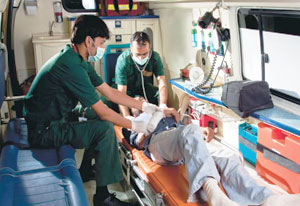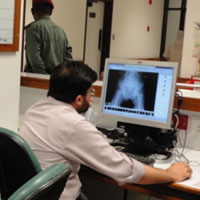Pakistan builds trauma and injury research capacity
September / October 2014 | Volume 13, Issue 5

Photo courtesy of Dr. Junaid Razzak,
Aga Khan University
Traffic accidents, terrorist bombs and earthquakes
contribute to a high rate of injury and trauma in Pakistan.
Fogarty-funded researchers are studying how to reduce
risks, improve care and limit death and disability.
People in Pakistan face a high risk of injury, whether from a traffic accident, terrorist bomb, cooking fire, or countless other causes. Until recently, the country had little research evidence to inspire and guide efforts to reduce this health burden, but that began changing with a Fogarty grant to a team of driven scientists.
"Injuries are now recognized as an important public health issue, and injury prevention is a research priority in Pakistan," said Fogarty investigator Dr. Adnan Hyder, of Johns Hopkins Bloomberg School of Public Health (JHSPH). "Fogarty funding was instrumental in helping transform research on emergency care and injury and trauma from an uncommon activity in Pakistan to a productive, recognized field."
The inspiration for change came from a group of researchers at JHSPH and Aga Khan University (AKU) in Karachi, who decided to produce evidence to focus academic and policy attention on the health problem. They sought funding from Fogarty's
trauma and injury program, which they have now received continuously since 2004. As their project has evolved, other funders also contributed support, including academic institutions, the WHO and several foundations.
At the outset, the team needed a clearer picture of the types, quantities and impact of injuries. Hyder, his co-investigator Dr. Ellen Mackenzie at JHSPH and Dr. Junaid Razzak at AKU spearheaded projects to create software for comprehensive emergency care data collection at district hospitals, methodology to accurately assess trauma and emergency care capacity, and a surveillance system to measure traffic injuries - the largest contributor to this health burden - as well as the impact of violence, including self-harm.
Along with data on injury and trauma, Pakistan needed researchers with relevant expertise, so Fogarty supported human capacity building efforts. To date, the initiative has produced more than half a dozen long-term trainees who have completed injury research. Initially, courses were offered at Johns Hopkins or online. Now they are trained at AKU through its own master's degrees in epidemiology and biostatistics, and in health policy and management. The university also inaugurated an emergency department, the first such unit in Pakistan, with Razzak as founding chair.
Research projects led by trainees and faculty have flourished. The first graduate of AKU's own long-term training program, for instance, completed a thesis tying the survival of patients with cardiac arrest to how quickly they were delivered to the hospital. Another researcher organized the country's first national seminar on suicide prevention, and a third is investigating whether intimate partner violence during pregnancy raises the rate of stillbirths.

Photo courtesy of Dr. Junaid Razzak,
Aga Khan University
Fogarty support has enabled Pakistan to increase
awareness of the trauma and injury in Pakistan, build
research capacity from scratch, leverage additional
funds and focus policymaker attention on reducing this
health burden.
Fogarty-supported trainees have published more than 20 papers in peer-reviewed scientific journals, on topics such as home injuries, child abuse, trauma registries and injury prevention. "These papers are not only testament to the productivity of our program," Hyder said. "They're also critical in generating new knowledge in the field for Pakistan and the region." Other low-resource countries with multiple injury risks can benefit from Pakistan's research showing how best to reduce injuries.
To extend research expertise outside Karachi, the team partnered with Khyber Medical University in Peshawar - an impoverished area near Afghanistan that suffers many types of natural disasters, such as earthquakes, and terrorist activity. Eleven fellows there are pursuing a master's degrees in public health. "That has been an incredible opportunity to expand beyond the main city of the country into an area that is extremely troubled," Hyder said. "No one was doing this outreach in research capacity before."
Fogarty supports capacity building for long-term gains, which typically involves developing a core group of experts who can instill their knowledge to the next generation of trainees, and this is happening in Pakistan. Six graduates with master's degrees supported by Fogarty are now on the Aga Khan University faculty, where they are designing curricula, teaching trainees and conducting and mentoring research.

Photo courtesy of Dr. Junaid Razzak,
Aga Khan University
Pakistani scientists have studied
ways to reduce the impact of trauma
and injury in Pakistan.
A key success of the program has also been to alert Pakistan's policymaking community to the health and economic cost of injury and trauma, and options for curtailing the harm.
With Fogarty support, the team has offered short-term courses, workshops, seminars and conferences on relevant topics, such as bioethics, cost-effectiveness in the health care system and disaster management. These sessions have been attended by hundreds of trainees and health care workers and officials. One international research symposium attracted more than 350 attendees. Furthermore, Razzak founded a professional emergency care society that was recognized by the country's College of Physicians and Surgeons, underscoring the status of emergency care as a distinct specialty in the national health system.
The ministry of health for the first time specified injuries as one of its focus areas and the government tasked national, provincial and city authorities to develop plans for handling mass casualties. This increased awareness by policymakers has also attracted international recognition - the WHO selected AKU as a collaborating center for the Eastern Mediterranean Region and sought its leadership in producing an area-wide report on road traffic injuries.
"Injuries continue to contribute to large numbers of deaths and disabilities in Pakistan," Razzak said. "But focused support from Fogarty has sensitized people and raised the agenda for emergency care and injury and trauma to a higher policy arena."
More Information
To view Adobe PDF files,
download current, free accessible plug-ins from Adobe's website.